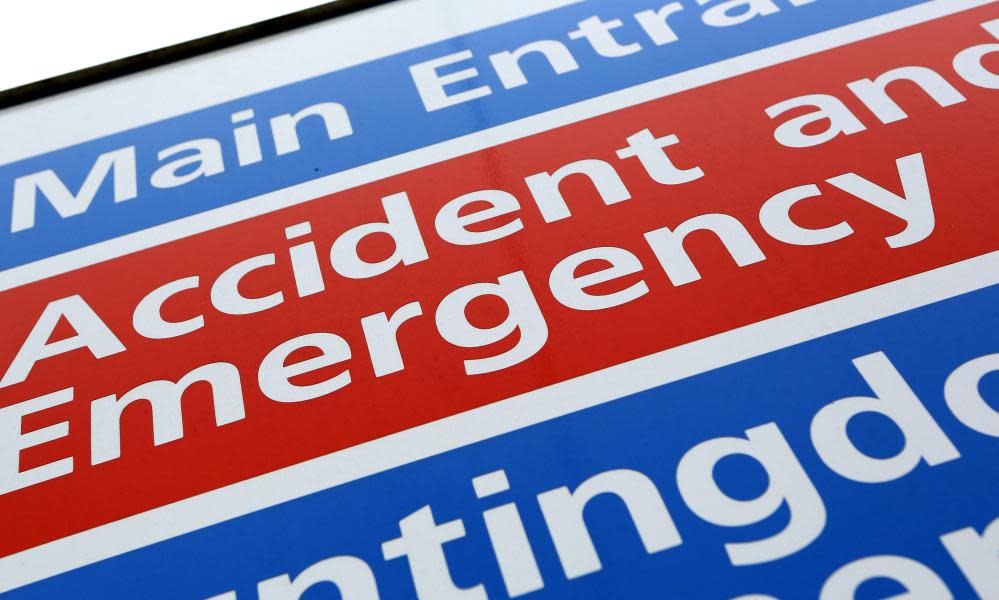Bed shortages leave Sunderland patients to sleep overnight in A&E

Patients have had to sleep overnight in the A&E unit of one of the NHS’s biggest hospitals because it is overwhelmed by the number of people needing care, a leaked memo reveals.
The situation has arisen at Sunderland Royal hospital because it has been running out of beds despite it having recently added an extra 50 to its normal stock of 970 beds to help it cope with winter pressures.
In a message sent to local GPs last Friday titled “significant surge within the trust”, NHS leaders in the city said: “There has been increased pressures on bed capacity over the past two to three days which is having a severe impact across the trust. Fifty more beds are being used, 40 boarding in different wards and 20 patients were stuck in ED [the emergency department] as no beds available, resulting in some patients having to sleep overnight in ED.
“There has been some cancellations of elective activity [operations] and extra consultants have been pulled into ED to help manage the demand. It would be very much appreciated if you could only refer patients to ED if all other possible solutions have been exhausted.”
The hospital is seeking to buy places in local care homes as another way of freeing up beds and ending the logjam in its A&E.
Those who slept overnight in the unit will have been patients whom doctors had decided to admit as medical emergencies but for whom hospital staff had not been able to find a bed.
Sunderland’s overcrowding is the latest example of how hospitals have been struggling to cope with demand this winter, especially with higher-than-usual levels of flu increasing the pressure on beds. The NHS in England has added about 1,000 beds to help relieve the strain but some hospitals have ended up full despite that.
One local GP said the hospital’s request to send patients to the A&E only if there was no alternative was “exasperating” and made family doctors feel like they were being “a nuisance” when they were already using alternatives to hospital care as often as possible.
Dr Julia Patterson, the lead for EveryDoctor, a network of frontline NHS medics, said: “This email perfectly illustrates the immense strain that NHS hospitals are currently under. Hospitals shouldn’t run at more than 85% occupied bed capacity. However, we know that many are now forced to run at a bed capacity much higher than this.
“This is a hospital where all staff are working extremely hard to cope with increased winter pressures. But after 10 long years of austerity, the NHS is underfunded and understaffed, and there is little resilience left in the system.”
Angela Wadmore, the divisional director for urgent and emergency care at South Tyneside and Sunderland NHS foundation trust, which runs the hospital, said: “Over the past week we have seen a big increase in seriously ill people requiring emergency admission to hospital. As we safely manage these pressures, sometimes it may not be possible to accommodate patients into an appropriate inpatient bed as quickly as we would like, resulting in some patients having to spend longer within our emergency department.
“When this does occur, patients are cared for with compassion and looked after safely by our excellent emergency department staff, each within their own dedicated individual room to ensure patient privacy and dignity is maintained. As soon as an inpatient bed becomes available, patients are then safely transferred to another part of the hospital.”
In recent weeks the Guardian has documented other examples of how hospitals are struggling to cope this winter. Cornwall Royal hospital recently told doctors they should discharge patients even though they may come to harm as a result because it was so short of beds. The Doctors’ Association UK called the move “morally repugnant and against the very fibre of what doctors stand for” while the British Medical Association said it was “a dire indictment of the state our NHS has been allowed to creep into”.
Last month Norfolk and Norwich hospital trust advised its senior doctors to make “the least unsafe decision” when deciding how best to treat patients, again because it was under what its medical director, Dr Erika Denton, said was “extreme pressure”.
Growing numbers of hospitals are redeploying nurses from wards as “corridor nurses” to look after the queues of patients building up waiting to get a bed.
Very sick children have had to be transferred sometimes many miles from home in order to get a place in a paediatric intensive care unit because of widespread shortages of such specialist beds.
Despite staff’s best efforts, a decade-long NHS funding squeeze, a serious lack of personnel in many areas of care and rising demand for care have led to the service recording its worst ever performance figures against key waiting-time targets in each of the last four months.
Boris Johnson declared last week that waiting times had become “unacceptable” and vowed to end the long delays.

 Yahoo News
Yahoo News 
